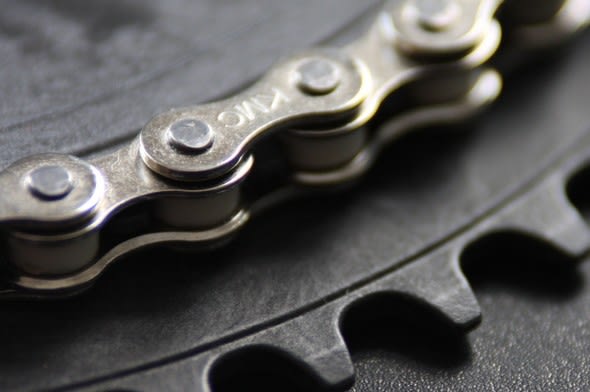 The Dutch Paralympic cycling team competing at the London Paralympics (from 29 August until 9 September) will be using new, ultra light and strong chains incorporating rollers made of Stanyl polyamide 46.
The Dutch Paralympic cycling team competing at the London Paralympics (from 29 August until 9 September) will be using new, ultra light and strong chains incorporating rollers made of Stanyl polyamide 46. These new chains were developed by DSM, innovation partner of the Dutch Olympic Committee (NOC NSF), and the Royal Dutch Cycling Union (Koninklijke Nederlandsche Wielren Unie, KNWU), in collaboration with KMC, the world’s largest manufacturer of bicycle chains.
In a racing bike, the chain rollers are very important because they are the contact points between the sprockets and the chain, transfering the tremendous force exerted by the rider to the wheels. The chain has to be very strong and at the same time it should run smoothly and friction-free along the sprocket. The new chains and sprockets use DSM’s Stanyl, a high performance polyamide 46, instead of steel. This means the chains are not only lighter but also move with less friction, which translates into greater speed.
Paralympian Alyda Norbruis about DSM’s innovation: ‘The chain gives me confidence and power, which makes my body feel more at ease. It gives me a great deal of balance, and the more balance, the better. The number one spot – that’s what I’m doing it all for. Nothing more, nothing less.’

‘This is the future! It’s something that all racing cyclists will want to use at the Rio Olympics, and we’re already using it now. We are very happy with this materials breakthrough that our innovation partner DSM has achieved,’ said Eelke van der Wal, the Paralympic cycling team’s coach.
Stanyl polyamide 46 is already used in a wide range of industrial gear and chain systems, where its low wear, low friction and low weight properties provide customers with a more efficient and quiet replacement for metals. In the future, Stanyl will also be used in the chains of ‘ordinary’ bicycles. The advantage of using Stanyl is that oil lubrication and squeaking chains will be things of the past.
DSM and NOC NSF have been ‘Partners in Sport’ since 2001. As innovation partner, DSM develops new products in the field of nutrition and materials. Cycling is one of the highlights in London, and in a sport where a few seconds can mean the difference between victory and defeat, innovations can tip the scales.
Rob van Leen, DSM’s Chief Innovation Officer: ‘After the protective clothing made from DSM’s ultra-strong fiber Dyneema, the chains based on Stanyl are another important materials innovation benefiting the athletes. The combination of reduced friction and low weight gives cyclists that extra bit of power that can make the difference at the finishing line. We wish the Paralympians lots of success in London.’
This summer, DSM presented various Olympic innovations in the field of nutrition and materials, including innovative cycling shorts incorporating Dyneema, which protect cyclists’ most vulnerable body parts (such as their thighs and lower back) in a fall. In addition, as innovation partner of the Dutch Rowing Federation, DSM developed new boats, including the boat used by the Women’s Eight team that won a bronze medal. The development of these boats involved the use of state-of-the art styrene-free resins in combination with carbon fibers, resulting in a hull that is 25% stiffer than that of conventional boats without compromising the boat’s light weight. This stiffness is important because in rowing, as in cycling, the aim is to translate the athletes’ energy directly into speed.



